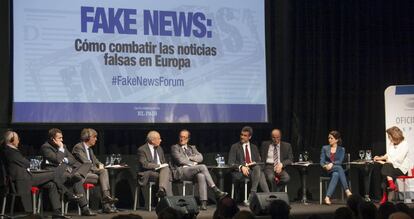Defending truth in the era of fake news
Europe’s leading media organizations have a duty to curb the spread of disinformation

Fake news is not a new phenomenon, but thanks to the power of modern technology, made-up stories and propaganda disguised as information are circulating like never before. The European Union, understanding the impact this kind of garbage content has on public debate and democracy, has dived into the heated discussion on how to tackle disinformation. The upcoming elections for the European Parliament in 2019 are seen as a litmus test. EU members are concerned that voters will be poisoned by fake news ahead of the elections, as happened during the Brexit vote, French and Italian elections and Catalan independence crisis.
Quality media organizations are the best guarantee to safeguard citizens’ right to be informed
But creating legislation for the entire EU – with corresponding sanctions – that is able to neutralize lies and fight against populist discourse that breeds hate, does not appear to be on the agenda. In the meantime, self-regulation is considered the easiest way to counter hostile propaganda and news stories that are designed to distort the truth.
Worryingly, two out of three Europeans come across one piece of fake news every day, according to EU member data. What’s more, 80% believe that fake news is a threat against democracy.
This pits Europe’s trusted media organizations against an enormous challenge, as was outlined on Tuesday by media bosses from the Leading European Newspaper Alliance (LENA), of which EL PAÍS forms part. It’s not just about presenting a united front against misinformation, it’s also about getting to the bottom of who is behind its production and dissemination. Quality media companies, which use reliable and verified data, prioritize journalistic truth, base their stories on facts and fact-check stories, are the best guarantee to safeguard citizens’ right to be informed.
Stopping anti-European messages from gaining ground requires the cooperation of tech companies such as Google and Facebook. The first, albeit insufficient, step is for tech companies to change their algorithms so that fake news is given a lower ranking and is harder to find online, and quality content is given greater visibility. It is also important to educate people so that they develop a social and critical awareness that is able to see through deceptive arguments.
Adopting these measures from a global perspective, in which all European states are involved, is the only way the EU will be able to successfully fight against the challenges posed by disinformation.
English version by Melissa Kitson.
Tu suscripción se está usando en otro dispositivo
¿Quieres añadir otro usuario a tu suscripción?
Si continúas leyendo en este dispositivo, no se podrá leer en el otro.
FlechaTu suscripción se está usando en otro dispositivo y solo puedes acceder a EL PAÍS desde un dispositivo a la vez.
Si quieres compartir tu cuenta, cambia tu suscripción a la modalidad Premium, así podrás añadir otro usuario. Cada uno accederá con su propia cuenta de email, lo que os permitirá personalizar vuestra experiencia en EL PAÍS.
¿Tienes una suscripción de empresa? Accede aquí para contratar más cuentas.
En el caso de no saber quién está usando tu cuenta, te recomendamos cambiar tu contraseña aquí.
Si decides continuar compartiendo tu cuenta, este mensaje se mostrará en tu dispositivo y en el de la otra persona que está usando tu cuenta de forma indefinida, afectando a tu experiencia de lectura. Puedes consultar aquí los términos y condiciones de la suscripción digital.








































